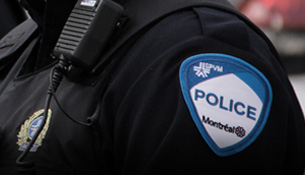
COVID-19 fraud
Scam Alert from the Canada Revenue Agency
If you get a text message saying you received a deposit for the Canada Emergency Response Benefit. Beware it is a scam! Do not reply or click on the link, delete the text and warn others.
Source : Canada Revenue Agency
While strict measures are being implemented to prevent the spread of COVID-19, fraudsters are taking advantage of the situation to claim new victims. The SPVM asks you to be vigilant in this context and to protect yourself against their strategies by being well informed.
Examples of fraudulent schemes
Fraudsters use several different means to achieve their objectives. In order to solicit donations, payments or personal information, they can pose as representatives from:
- the Canada Revenue Agency
- a cleaning company;
- the Public Health Agency of Canada;
- the Red Cross;
- the World Health Organization;
- government departments.
Fraudsters also tend to take advantage of public rumours, fears and uncertainties for the sole purpose of committing scams or cybercrimes. To achieve this, they use various means to reach potential victims, such as:
- text messages;
- telephone calls;
- emails;
- door-to-door.
INCREASE IN FRAUD BY ELECTRONIC TRANSFER
Fraudsters’ scheme
The fraudster posts a good on an online resale site. Once the buyer confirms their desire to purchase the good, the fraudster asks them to make an electronic transfer to an email address before going to pick up the object at a given address. He specifies that a security code will be given to them when the goods are received and that the money will only be transferred at that time.
However, after the transfer has been made, the victim realizes that the pick-up location is a fake address, that the object does not exist and that they have no more means of communicating with the seller. Their money, on the other hand, was deposited without requiring a security code.
Prevention tips
When you make a purchase on a resale site, we recommend not to initiate any transfer without having seen and inspected the good that you want to buy.
Also note that most banks allow automatic deposit or account transfer under various conditions, without using a security code.
Fraudulent senior solicitations
Individuals aged 70, who have to stay home because of the measures recommended by the Gouvernement du Québec, can be targeted by fraudsters. Consult the prevention tips prepared for them here.
Prevention tips
To protect yourself and avoid falling into their trap, follow these prevention tips:
- Beware of false or misleading information;
- Beware of expensive and substandard products, and miracle remedies (beware of offers that are too attractive or easy);
- Beware of unsolicited emails from medical advisories containing links or attachments;
- Beware of unauthorized charities that request a donation in exchange for a product;
- Never click on links, rather go directly to the official site;
- Find out about the official websites of recognized organizations before submitting any personal information (credit card number, social insurance, etc.). It is quite rare for government agencies to request such information by text message or even email.
Before making a donation, giving personal information or doing business with a company, consult the following sites:
- Anti-Fraud Centre
- Public Health Agency of Canada
- World Health Organization
- To check if a charity is duly registered: Canada Revenue Agency
For help or to report fraud
To report any ill-intentioned person, contact your neighbourhood police station at 514-280-01XX (XX corresponding to the PDQ number) to quickly inform the police. For any emergency, dial 911.
You can also report fraud anonymously and confidentially to Info-Crime Montréal online or by calling 514-393-1133. You can also call the Canadian Anti-Fraud Centre at 1-888-495-8501.



